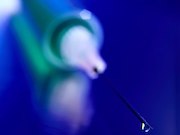Immediate post-resection gemcitabine reduces recurrence over 4 years in low-grade bladder cancer
TUESDAY, May 8, 2018 (HealthDay News) — Immediate post-resection intravesical installation of gemcitabine is associated with reduced recurrence over four years for patients with suspected low-grade non-muscle-invasive urothelial cancer, according to a study published in the May 8 issue of the Journal of the American Medical Association.
Edward M. Messing, M.D., from the University of Rochester in New York, and colleagues randomized patients to receive intravesical instillation of gemcitabine (201 patients) or saline (205 patients) for one hour immediately following transurethral resection of bladder tumor (TURBT); 383 patients completed the trial.
The researchers found that 67 and 91 patients in the gemcitabine and saline groups, respectively, had cancer recurrence within four years (four-year estimate, 35 versus 47 percent; hazard ratio, 0.66; 95 percent confidence interval, 0.48 to 0.90; P < 0.001). Among the patients with low-grade non-muscle-invasive urothelial cancer who underwent TURBT and drug instillation, 34 of 102 and 59 of 113 in the gemcitabine and saline groups, respectively, had cancer recurrence (four-year estimates, 34 versus 54 percent; hazard ratio, 0.53; 95 percent confidence interval, 0.35 to 0.81; P = 0.001). There was no significant difference between the groups in the proportion of patients with tumors that progressed to muscle invasions (five and 10 in the gemcitabine and saline groups, respectively; P = 0.22) and died of any cause (17 and 25 patients, respectively; P = 0.12).
“These findings support using this therapy, but further research is needed to compare gemcitabine with other intravesical agents,” the authors write.
Several authors disclosed financial ties to pharmaceutical companies, including Eli Lilly, which markets gemcitabine and partially funded the study.
Copyright © 2018 HealthDay. All rights reserved.








